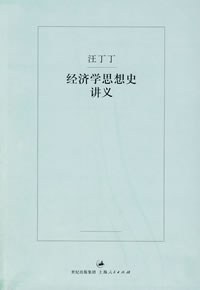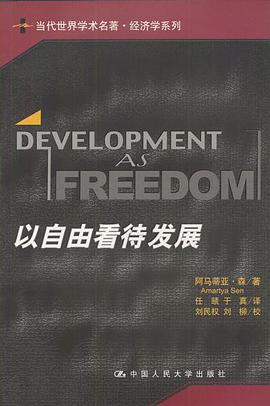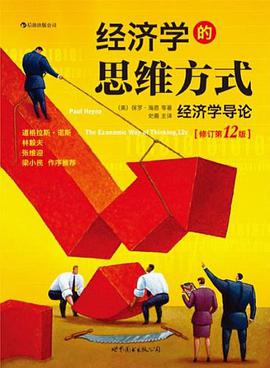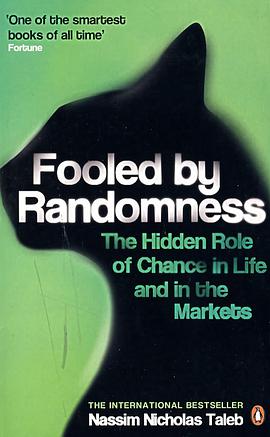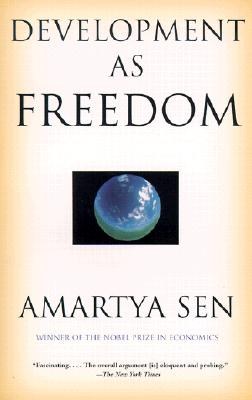经济学
以自由看待发展 豆瓣
Development as Freedom
7.8 (6 个评分)
作者:
[印度] 阿马蒂亚·森
译者:
任赜
/
于真
中国人民大学出版社
2002
- 7
《以自由看待发展》是阿马蒂亚·森综合他在经济学基础理论、经验研究以及道德——政治哲学领域多年成果的一部里程碑式的著作。他改变狭隘发展观的旧范式,阐述人的实质自由是发展的最终目的和重要手段,建立了全新的理论框架。全书论证,发展是涉及经济、政治、社会、价值观念等众多方面的一个综合过程,它意味着消除贫困、人身束缚、各种歧视压迫、缺泛法治权利和社会保障的状况,从而提高人们按照自己的意愿来生活的能力。森根据大量的经验研究资料,分析了发展中国家面临的重大问题,阐明在实践中富有成效的解决途径。在强调市场机制、全球化对提高人们生活水平做出基础性重大贡献的同时,他指出还需要政府和社会在人的生存、保健、教育等领域承担责任,更需要人作为发展的主体在全面的社会交往和变革中发挥主动作用。
经济学的思维方式(修订第12版) 豆瓣
The Economic Way of Thinking
8.2 (10 个评分)
作者:
[美] 保罗·海恩
/
[美] 彼得 · 勃特克
…
译者:
史晨
世界图书出版公司
2012
- 3
本书是风靡国际的一部另类的经典经济学教科书。与主流经济学教材不同,本书回避了繁复的公式、函数、运算,通过深入浅出和饶有趣味的图画,将日常生活中纷繁复杂、看似毫无关联的一些社会现象,和一套富有一致性的思维框架结合起来,展示出一种“经济学的想象力”。正如道格拉斯•诺斯所说,经济学的力量就在于它是一种思维方式,本书的目的正是引导读者学会经济学推理方式,从而能够像经济学家一样思考问题。
《经济学的思维方式》已经被翻译成多种语言,享誉全世界,堪称经济学教育领域的一部标尺性著作。自2008年第11版翻译引进以来,在大专院校和非专业读者中都引起了相当的反响,荣获了多项优秀图书奖。作者在11版的基础上,对全书的结构和内容作了大量修订,相信会给读者带来全新的认识。
《经济学的思维方式》已经被翻译成多种语言,享誉全世界,堪称经济学教育领域的一部标尺性著作。自2008年第11版翻译引进以来,在大专院校和非专业读者中都引起了相当的反响,荣获了多项优秀图书奖。作者在11版的基础上,对全书的结构和内容作了大量修订,相信会给读者带来全新的认识。
Fooled by Randomness 豆瓣
作者:
Nassim Nicholas Taleb
Penguin
2007
- 3
Fooled by Randomness is a standalone book in Nassim Nicholas Taleb’s landmark Incerto series, an investigation of opacity, luck, uncertainty, probability, human error, risk, and decision-making in a world we don’t understand. The other books in the series are The Black Swan, Antifragile, Skin in the Game, and The Bed of Procrustes.
Fooled by Randomness is the word-of-mouth sensation that will change the way you think about business and the world. Nassim Nicholas Taleb–veteran trader, renowned risk expert, polymathic scholar, erudite raconteur, and New York Times bestselling author of The Black Swan–has written a modern classic that turns on its head what we believe about luck and skill.
This book is about luck–or more precisely, about how we perceive and deal with luck in life and business. Set against the backdrop of the most conspicuous forum in which luck is mistaken for skill–the world of trading–Fooled by Randomness provides captivating insight into one of the least understood factors in all our lives. Writing in an entertaining narrative style, the author tackles major intellectual issues related to the underestimation of the influence of happenstance on our lives.
The book is populated with an array of characters, some of whom have grasped, in their own way, the significance of chance: the baseball legend Yogi Berra; the philosopher of knowledge Karl Popper; the ancient world’s wisest man, Solon; the modern financier George Soros; and the Greek voyager Odysseus. We also meet the fictional Nero, who seems to understand the role of randomness in his professional life but falls victim to his own superstitious foolishness.
However, the most recognizable character of all remains unnamed–the lucky fool who happens to be in the right place at the right time–he embodies the “survival of the least fit.” Such individuals attract devoted followers who believe in their guru’s insights and methods. But no one can replicate what is obtained by chance.
Are we capable of distinguishing the fortunate charlatan from the genuine visionary? Must we always try to uncover nonexistent messages in random events? It may be impossible to guard ourselves against the vagaries of the goddess Fortuna, but after reading Fooled by Randomness we can be a little better prepared.
Named by Fortune One of the Smartest Books of All Time
A Financial Times Best Business Book of the Year
Fooled by Randomness is the word-of-mouth sensation that will change the way you think about business and the world. Nassim Nicholas Taleb–veteran trader, renowned risk expert, polymathic scholar, erudite raconteur, and New York Times bestselling author of The Black Swan–has written a modern classic that turns on its head what we believe about luck and skill.
This book is about luck–or more precisely, about how we perceive and deal with luck in life and business. Set against the backdrop of the most conspicuous forum in which luck is mistaken for skill–the world of trading–Fooled by Randomness provides captivating insight into one of the least understood factors in all our lives. Writing in an entertaining narrative style, the author tackles major intellectual issues related to the underestimation of the influence of happenstance on our lives.
The book is populated with an array of characters, some of whom have grasped, in their own way, the significance of chance: the baseball legend Yogi Berra; the philosopher of knowledge Karl Popper; the ancient world’s wisest man, Solon; the modern financier George Soros; and the Greek voyager Odysseus. We also meet the fictional Nero, who seems to understand the role of randomness in his professional life but falls victim to his own superstitious foolishness.
However, the most recognizable character of all remains unnamed–the lucky fool who happens to be in the right place at the right time–he embodies the “survival of the least fit.” Such individuals attract devoted followers who believe in their guru’s insights and methods. But no one can replicate what is obtained by chance.
Are we capable of distinguishing the fortunate charlatan from the genuine visionary? Must we always try to uncover nonexistent messages in random events? It may be impossible to guard ourselves against the vagaries of the goddess Fortuna, but after reading Fooled by Randomness we can be a little better prepared.
Named by Fortune One of the Smartest Books of All Time
A Financial Times Best Business Book of the Year
Development as Freedom 豆瓣 Goodreads Goodreads
Development as Freedom
作者:
Amartya Sen
Anchor
2000
- 8
By the winner of the 1988 Nobel Prize in Economics, an essential and paradigm-altering framework for understanding economic development--for both rich and poor--in the twenty-first century.
Freedom, Sen argues, is both the end and most efficient means of sustaining economic life and the key to securing the general welfare of the world's entire population. Releasing the idea of individual freedom from association with any particular historical, intellectual, political, or religious tradition, Sen clearly demonstrates its current applicability and possibilities. In the new global economy, where, despite unprecedented increases in overall opulence, the contemporary world denies elementary freedoms to vast numbers--perhaps even the majority of people--he concludes, it is still possible to practically and optimistically restain a sense of social accountability. Development as Freedom is essential reading.
Freedom, Sen argues, is both the end and most efficient means of sustaining economic life and the key to securing the general welfare of the world's entire population. Releasing the idea of individual freedom from association with any particular historical, intellectual, political, or religious tradition, Sen clearly demonstrates its current applicability and possibilities. In the new global economy, where, despite unprecedented increases in overall opulence, the contemporary world denies elementary freedoms to vast numbers--perhaps even the majority of people--he concludes, it is still possible to practically and optimistically restain a sense of social accountability. Development as Freedom is essential reading.
